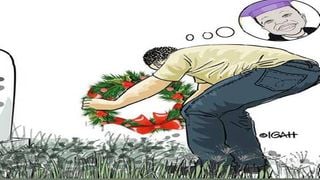
Mostly, fathers bury children who are not yet dead when all hope is gone.
| Samuel Muigai | Nation Media GroupDN2
Premium
Of parents who bury their children alive
If you ask any father, they will tell you they want their children to bury them. Parents do not want to outlive their children.
It’s one thing to bury a dead child. It’s another one to bury a child who is not yet dead. Most times, fathers who go through this situation bury a child who is “living dead”. Fathers will not say it aloud, but they know when this strange phenomenon happens.
Some who are perceptive even know the exact moment the said child ceased to exist. Sure, the said child may be alive and kicking, but to the parent, they kicked the bucket ages ago.
Some of us witnessed this phenomenon several years ago when a mother confessed, on national TV, that she knew it was only a matter of time before death caught up with her wayward son. This child was a gangster. All his mother’s pleas, prayers and protestations had fallen on deaf ears.
In not so many words, the mother implied that she had buried her son several years prior. I believe she grieved and even had closure while her son was still alive.
Rubicon
Parents do not easily give up on their children. I have seen many parents defending their child to death when mob injustice was administered to the parent’s flesh and blood.
When a parent gives up a child, it means the child has crossed the Rubicon. The child has passed the point of no return. Anything they do will only draw them further away from their parent.
Miracles still happen, though. There are times when such courses are reversed and the fate of a virtually predeceased child is reversed. When that happens, it’s akin to a resurrection.
The limits of hope
Men hope their offspring will be the best versions of themselves. We hope our children will not make the same mistakes we did. We spend our resources to ensure they avoid some pitfalls while, at the same time, trying to guide them - as best as we know - toward their fullest potential.
It’s this hope that makes fathers do menial jobs. It causes us to make sacrifices. It makes some men hide debilitating illnesses, as they put their lives on the line for their children.
Mostly, fathers bury children who are not yet dead when all hope is gone. This happens when a father realises that the huge amounts of hope he poured on a child were an exercise in futility. The child may have been given the best that money could buy, yet they have turned out to be morally bankrupt.
Hope is like a candle. It can light up a dark room. It can light up other candles. But it can also be extinguished by winds or human hands. Sometimes children funnel the winds that extinguish their candles. Other times a man can be a victim of circumstance.
And just like a candle, hope can only burn for so long. The wick that makes a father’s candle has its limits. So does the wax. Both have everything to do with mortality. Fathers know when their wax and wicks are about to burn out. At such times, they know the die has been cast; for them to die in peace, they will first have to bury a child who is still alive.
There is no sadder burial than one of a son who’s still alive; which is done by a father who’s barely alive.





